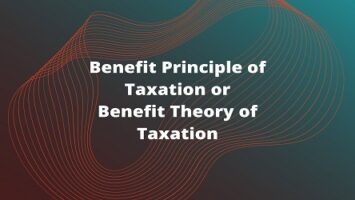Table of Contents
Objective Approach of the Ability to Pay Theory:
In view of the practical difficulties of sacrifice theories or subjective approach, some writers, especially American, have presented an objective approach to measure the ability to pay. Professor Seligman has used the term ‘faculty’ to indicate ability in the objective (not abstract) sense. Thus, it is also known as the faculty theory of ability to pay.
Contrary to the sacrifice theory or subjective approach, the faculty theory takes into account the money value of the taxable capacity of the taxpayer instead of his feelings and sufferings. Thus, faculty theory, unlike the sacrifice theory, is not based on the psychological feelings of a tax-payer, but on his taxable capacity, measured in terms of his income, accumulated wealth, and property, etc. Hence, faculty theory takes into account various external factors, including the taxpayer’s income and property, etc., which actually influence the tax-paying ability of an individual. For example, it takes into account not only the income as such but also how this income has been earned (whether through personal labor or property) and how the property is acquired, i.e., whether inherited or accumulated by means of personal effort. A person’s productive power depends largely on the economic structure of the society and the benefits that he enjoys in society, hence, the economic structure and the benefits that an individual enjoys in that economic structure should also be taken into account while measuring his ability to pay. Thus, faculty theory gives a social flavor as against the individualistic approach of sacrifice theories.
Index of Ability in Faculty Theory:
There are three important ways to measure the ability to pay of a person according to the faculty theory of ability to pay, i.e., income, property, and consumption.
Income- Income refers to an amount received by a family from an activity during a certain period of time including the value of self-owned durable consumer goods. But only net income should be taken into account.
Property- The amount of property and accumulated wealth is also considered an important measure of the ability to pay taxes because the level of living of the people is not only influenced by income but also by the accumulated wealth and property.
Consumption Expenditure- Some economists like Professor Kaldor argued that neither income nor property is a true measure of the ability to pay taxes. He argued that the economic well-being of the people depends upon the income spent, i.e., Accumulated wealth and property cannot provide satisfaction until it is used for consumption. Hence, consumption is an important measure of the ability to pay.
Defects:
Prof. Seligman finds the following defects in the measurement of the ability to pay according to the objective approach.
(1) A general property tax is regressive, as it falls more heavily upon smaller than upon larger property.
(2) There is a lack of universality or failure to reach each personal property.
(3) It lacks in uniformity in assessment.
(4) It may provide an incentive to dishonesty.
The question or the method of measuring the tax-paying ability of an individual still remains unanswered, because the objective approach also suffers from serious limitations. In fact, the property was an important basis of taxation in earlier days. In modern times, however, income is accepted as the fair index of measuring the ability to pay of an individual. Income as the basis has the advantage that it easily allows progression in taxation. In practice, of course, property and similar considerations must also be taken into account besides income, while determining the tax-paying ability of an individual. It should also be noted that with regard to income, it is not only the amount that is important, but also the source, i.e., whether it is earned from personal services or from the ownership of property, should also be taken into account. Again, the size of the family, the regularity of income, and the time period over which it is calculated should also be taken into consideration while determining the tax-paying ability of a person. It is, thus, obvious, that the objective approach plays a supplementary role to the subjective approach in achieving the objective of just distribution of burden of taxation.
In view of the above facts, it can be concluded that ability theory is the most widely accepted principle for distributing the burden of taxation justly.









Comments (No)